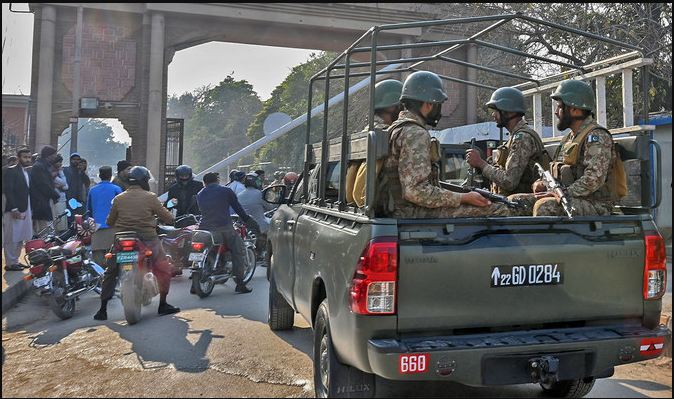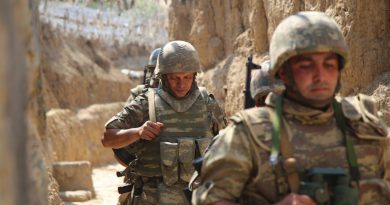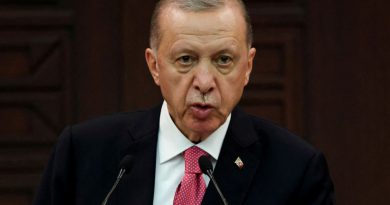Global Watch | Pakistan’s military fractures as the court disintegrates and cedes power to the generals
The officers most likely being targeted are Lt Gen (retd) Salman Ghani, the former DG of the ISI, Lt Gen (retd) Faiz Hamid, and Lt Gen Muhammad Aamer, the Corps Commander of the 30 Corps in Gujranwala, though he withheld the names of senior military officers facing court martial and other proceedings.
Islamabad – It is now evident that the military’s pressure caused not only Pakistan’s political establishment but also the country’s higher courts to fall. There is a clear cause and effect relationship between a few occurrences that at first glance appear to be unconnected.
Let’s examine the events that would prompt one to draw these inferences.
Armed forces purge
After the 9 May incident, when enraged PTI supporters attacked military installations, the cracks in the military institution are extremely evident. Under the Army Act, more than 102 people have been detained and are currently undergoing trials in 17 military courts. The fact that these Pakistani trials are widely recognised to be a sham, and the fact that the majority of them are going to lose their lives as a result, seals their fate.
Following the arrest of the former prime minister Imran Khan on May 9, Major General Sharif claimed that three high-ranking officers, including a Lieutenant-General, had been relieved of their duties and that action had been taken against three major generals and seven brigadiers.
The officers most likely being targeted are Lt Gen (retd) Salman Ghani, the former DG of the ISI, Lt Gen (retd) Faiz Hamid, and Lt Gen Muhammad Aamer, the Corps Commander of the 30 Corps in Gujranwala, though he withheld the names of senior military officers facing court martial and other proceedings.
Judiciary’s resignation
A significant portion of the civilised world had placed hope in Pakistan’s Supreme Court to restrain the army’s power. However, the military now has complete control over the judiciary. A request to stop the military actions against civilians was denied by the Supreme Court of Pakistan within 24 hours after the DG, ISPR press conference. The six-member bench, presided over by Chief Justice of Pakistan (CJP) Umar Ata Bandial, was deliberating petitions against the prosecution of civilians in connection with the May 9 riots by military courts. The court also included the Chief Justice of Pakistan (CJP), Justices Ijazul Ahsan, Muneeb Akhtar, Yahya Afridi, Mazahar Naqvi, and Ayesha Malik.
The Attorney General of Pakistan, Mansoor Awan, claimed that no trials are being held in military courts regarding the May 9 incidents, despite the DG, ISPR having categorically stated 24-hours earlier that 102 civilians have been detained and are being tried under the Army Act. This illustrates the discrepancies between the government’s and military’s versions of events.
The conversation that took place in the courtroom between the judges and the solicitors for the government and PTI reads like the dialogue from a strange drama. It demonstrates how Pakistan’s highest court is now humming the military’s tune.
The Express Tribune, a newspaper published in Pakistan, covered this exchange in great detail. Here are a few samples:
Uzair Bhandari, the lawyer for the chairman of the Pakistan Tehreek-e-Insaf (PTI), asserted in front of a larger bench that the military’s media branch has verified that civilians are being tried in military courts at the beginning of the hearing. With regard to the military trial of civilians, PTI lawyer Bhandari stated, “I have nothing to do with the issue of trial against the soldiers.”
“The DG ISPR said yesterday that a trial is ongoing,” he emphasised, “and this contradicts the AGP’s statement.” The AGP replied that he still stood by what he had said earlier. He highlighted that “no civilian has yet been tried in military courts.” “We believe you,” CJP Bandial remarked.
In spite of the Pakistani military’s unequivocal denial, the Chief Justice of Pakistan chose to believe the Attorney General of Pakistan.
“CJ Bandial questioned how “the allegations were established without evidence” against the 102 individuals. This situation is incomprehensible, he declared.
Further, Justice Ahsan stated, “The records show that the details of the accusations are not even available.” Bhandari added that it is also unlawful for army officers to arrest the accused. The attorney stated, “Many facts are recognised, and from these facts, malice can be inferred.”
The CJP once said, “It is futile to accuse a person without evidence.” Addressing the AGP, he stated that the court had requested information about the accused that “will be beneficial to all parents” involved. AGP Awan claimed that he had supplied every information, including the written records, throughout his arguments. The majority of the entire process, including the specifics of the incident on May 9 that led to the accused’s extradition, are listed in the rolls. However, he emphasised that since the trial is not a summary trial, some time will be needed to finish it.
When the accused were taken into custody, the CJ questioned if all legal conditions had been met. In response, the AGP gave the CJP a file including all of the information about the 102 accused civilians and stated that their parents could visit them once a week by making an appointment. If the suspects had not yet been charged, Justice Afridi questioned how they could have been nominated.
Justice Malik also questioned why the accused’s information was being withheld. She questioned whether there was a problem with making the names of the 102 people publicly known, stressing that doing so would put an end to the misunderstanding and rumours around their identities.
AGP Awan asked the court to keep the information private and assured the bench that the government would get in touch with the relatives of everyone detained within 24 hours.
But Justice Ahsan said that there was still a case for making the list public since it would “put an end to speculations.” Justice Yahya Afridi remarked that it is preferable for them to make touch with their relatives before the dissemination of details.
After being sternly questioned about the secrecy surrounding the military’s unlawful detention of 102 citizens, the Chief Justice of Pakistan’s timid response was surprising. CJP Bandial responded to all of the aforementioned reasons and queries by saying that it would be nice for the families to learn more about the accused before Eid.
The Chief Justice of Pakistan (CJP) stated in this case that “We are not giving an injunction now, I will be available after Eid, if there is any important development, I can be informed,” despite the fact that the lives of 102 civilians are hanging in the balance in Pakistan and that their families are also being kept in the dark about their arrests. The government ought to work with the populace to allay their worries. Otherwise, problems could emerge.
The hearing in the lawsuit challenging the prosecution of civilians in military courts by the Pakistan Supreme Court was postponed to the third week of July.
Conclusion
The Supreme Court of Pakistan’s docile capitulation is a blatant sign that the military is increasing its control over Pakistan. Even while Pakistan never had many democratic institutions, what was once just a facade is now disintegrating. It is obvious that Pakistan is on the verge of irreversibility. Over the past 75 years, it has changed from a nation to a military cantonment, and now the divisions inside the military are also apparent.



